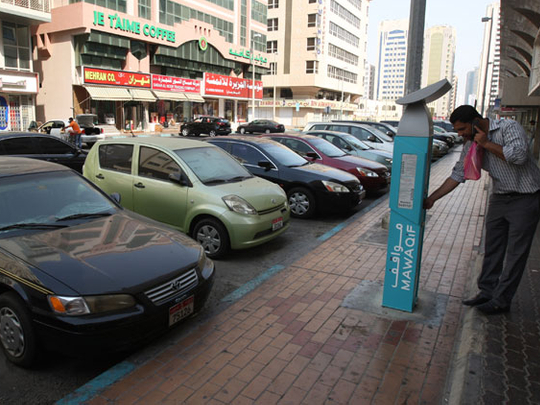
Abu Dhabi: New measures introduced on Thursday that force motorists to pay three hours more for public parking until midnight were supposed to discourage motorists from hogging valuable street-side spaces because of the extra cost.
The additional burden of up to Dh9 more per day was expected to serve as an incentive to unlock parking spaces from those who previously parked for free overnight from 9pm to 9am in congested areas of the city.
But motorists who spoke to Gulf News on Thursday said finding parking in their respective neighbourhoods was just as difficult, forcing them to park in commercial parking spaces that cost Dh3 per hour, up from the Dh2 per-hour fee in residential zones.
Omar Al Shelbi said he has a permit to park in his neighbourhood street-side spaces but can rarely find an opening which forces him to drive to a nearby commercial district with open spaces and pay more.
“If I leave work at 5pm and see my friends until 12 midnight, I will pay Dh2 per hour, for seven hours, that is if I found a parking in a black-and-blue paved area [residential area],” the 23-year-old accountant said.
“Even with my parking permit, I rarely find empty spots outside my home and usually end up parking in a non-residential parking area anyway.”
The lack of public street parking in some areas is further compounded by rules that allow only two residential parking permits per household.
A Mawaqif representative confirmed that those without residential parking permits may resort to parking in commercial areas.
“Parking in non-residential areas, which include premium parking and standard parking areas, will require a fee to be paid from 8am until midnight if residents without permits wish to park there,” the Mawaqif representative said.
He told Gulf News that the rule for residents without permits parking in residential areas is only valid as long as they pay an hourly fee until 9pm.
“They cannot park there after that, even if they pay. This rule has not changed. All violators will be fined if they do not move their cars to a non-residential location,” he said.
Laith Awwad, 31, a Jordanian oil-field engineer, said he expects to spend more money.
I used to pay Dh4 for the two hours I spend to rest at home after work. After returning from the gym in Medinat Zayed at 9pm, I would park my car in the closest premium parking spot overnight for free.
“Now, I will have to do the same, but instead of walking the long distance from the premium spot to my house in exchange for a free parking, I will have to pay Dh9, for three hours as well.”
“This brings my total amount to Dh13 per day,” said.












